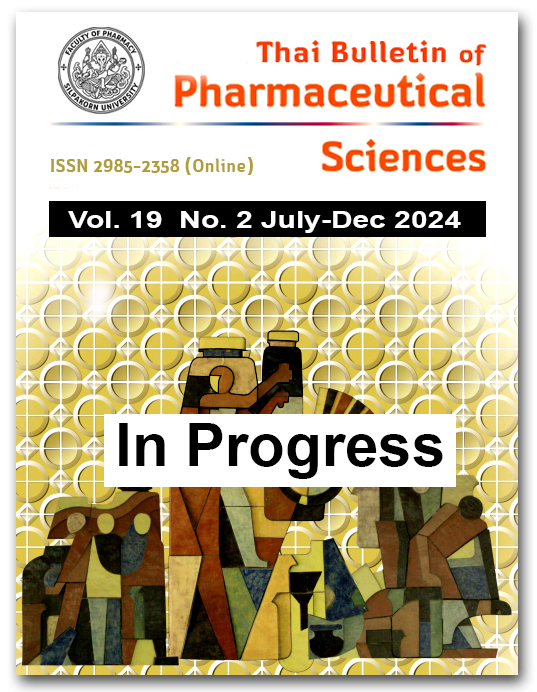INCIDENCE AND RISK FACTORS ASSOCIATED WITH NEUROLOGICAL ADVERSE REACTIONS IN FOCAL EPILEPSY PATIENTS USING LEVETIRACETAM
DOI:
https://doi.org/10.69598/tbps.19.2.165-175Keywords:
focal epilepsy, levetiracetam, neurological adverse reactionsAbstract
Levetiracetam is commonly prescribed as an anticonvulsant drug to treat epilepsy, but it may also cause neuropsychiatric adverse events such as drowsiness, aggression, and depression. However, the incidence and risk factors associated with neuropsychiatric adverse events to levetiracetam among patients with focal epilepsy in Thailand remain unclear. The objective of this study was to determine the incidence and risk factors associated with neuropsychiatric adverse events in focal epilepsy patients receiving levetiracetam. For this purpose, we retrospectively collected data from the medical chart review of patients with focal epilepsy between January 2018 and December 2021 who received treatment in the epilepsy clinic at Chulalongkorn Hospital. The results revelaed that of the total of 220 patients included in the study, 78 patients (35.3%) experienced neuropsychiatric adverse events. Females, persons of young age, and patients with drug-resistant epilepsy have risk factors associated with neuropsychiatric adverse events. Therefore, it can be concluded that the incidence of neuropsychiatric adverse events in this study was not different from that of previous studies. The female gender, persons of young age, and patients with drug-resistant epilepsy should be closely monitored.
References
World Health Organization. Epilepsy: Key facts [Internet]. 2023 [cited 2023 Jan 22]. Available from: http://www.who.int/news-room/fact-sheets/detail/epilepsy.
Lyseng-Williamson KA. Spotlight on levetiracetam in epilepsy. CNS Drugs. 2011;25(10):901-5.
Mbizvo GK, Dixon P, Hutton JL, Marson AG. The adverse effects profile of levetiracetam in epilepsy: A more detailed look. Int J Neurosci. 2014;124(9):627-34.
Patsalos PN. Clinical pharmacokinetics of levetiracetam. Clin Pharmacokinet. 2004;43(11):707–24.
Doerrfuss JI, Kowski AB, Holtkamp M. Etiology-specific response to antiseizure medication in focal epilepsy. Epilepsia. 2021;62(9):2133–41.
Neligan A, Walker M, Rajakulendran S. Challenge to levetiracetam’s de facto position as generic first-line antiseizure medication. Pract Neurol. 2022;22(2):94–5.
Kwan P, Brodie MJ. Early identification of refractory epilepsy. N Engl J Med. 2000;342(5):314–9.
Perucca P, Carter J, Vahle V, Gilliam FG. Adverse antiepileptic drug effects: Toward a clinically and neurobiologically relevant taxonomy. Neurology. 2009;72(14):1223–9.
Weintraub D, Buchsbaum R, Resor Jr SR, Hirsch LJ. Psychiatric and behavioral side effects of the newer antiepileptic drugs in adults with epilepsy. Epilepsy Behav. 2007;10(1):105–10.
Chen B, Choi H, Hirsch LJ, Katz A, Legge A, Buchsbaum R, et al. Psychiatric and behavioral side effects of antiepileptic drugs in adults with epilepsy. Epilepsy Behav. 2017;76:24–31.
Pinckaers FME, Boon ME, Majoie MHJM. Risk factors predisposing to psychotic symptoms during levetiracetam therapy: A retrospective study. Epilepsy Behav. 2019;100(Pt A):106344.
Alexopoulos EC. Introduction to multivariate regression analysis. Hippokratia. 2010 Dec;14(Suppl 1):23-8.
Manreza MLG, Pan TA, Carbone EQ, Vattimo ACA, Herrera R, Morais DC, et al. Efficacy and safety of levetiracetam as adjunctive therapy for refractory focal epilepsy. Arq Neuropsiquiatr. 2021;79(4):290-8.
Cao Y, He X, Zhao L, He Y, Wang S, Zhang T, et al. Efficacy and safety of levetiracetam as adjunctive treatment in children with focal onset seizures: A systematic review and meta-analysis. Epilepsy Res. 2019;153:40-8.
Yates SL, Fakhoury T, Liang W, Eckhardt K, Borghs S, D'Souza J. An open-label, prospective, exploratory study of patients with epilepsy switching from levetiracetam to brivaracetam. Epilepsy Behav. 2015;52(Pt A):165-8.
Weintraub D, Buchsbaum R, Resor SR Jr, Hirsch LJ. Psychiatric and behavioral side effects of the newer antiepileptic drugs in adults with epilepsy. Epilepsy Behav. 2007;10(1):105–10.
Mula M, Trimble MR, Yuen A, Liu RS, Sander JW. Psychiatric adverse events during levetiracetam therapy. Neurology. 2003;61(5):704–6.
Sirsi D, Safdieh JE. The safety of levetiracetam. Expert Opin Drug Saf. 2007;6(3):241–50.
Kang BS, Moon HJ, Kim YS, Lee ST, Jung KH, Chu K, et al. The long-term efficacy and safety of levetiracetam in a tertiary epilepsy centre. Epileptic Disord. 2013;15:302–10.
Chen D, Bian H, Zhang L. A meta-analysis of levetiracetam for randomized placebo-controlled trials in patients with refractory epilepsy. Neuropsychiatr Dis Treat. 2019;15:905–17.
Zhao F, Kang H, You L, Rastogi P, Venkatesh D, Chandra M. Neuropsychological deficits in temporal lobe epilepsy: A comprehensive review. Ann Indian Acad Neurol. 2014;17(4):374–82.
Reimers A. New antiepileptic drugs and women. Seizure. 2014;23(8):585-91.
Svalheim S, Sveberg L, Mochol M, Taubøll E. Interactions between antiepileptic drugs and hormones. Seizure. 2015;28:12-7.
Downloads
Published
How to Cite
Issue
Section
License
All articles published and information contained in this journal such as text, graphics, logos and images is copyrighted by and proprietary to the Thai Bulletin of Pharmaceutical Sciences, and may not be reproduced in whole or in part by persons, organizations, or corporations other than the Thai Bulletin of Pharmaceutical Sciences and the authors without prior written permission.



